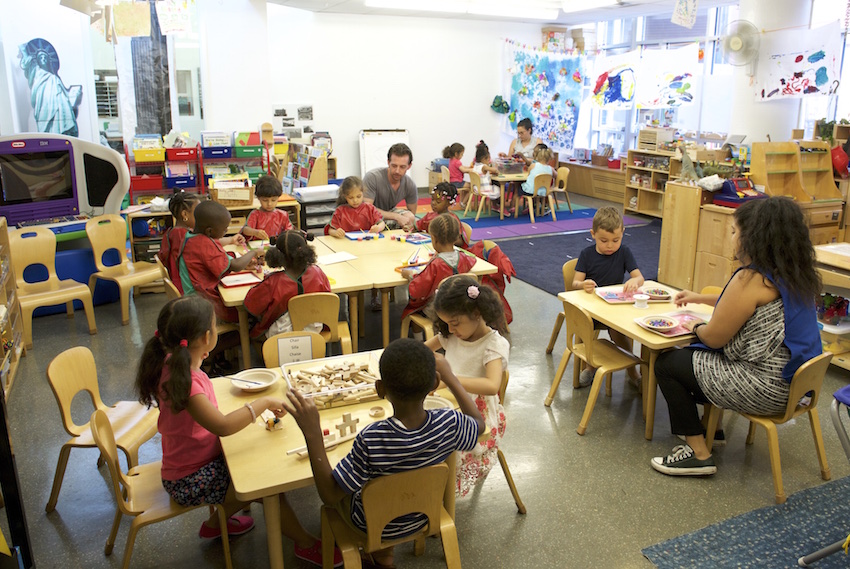
September 26, 2019
In 2016, the U.S. Bureau of Labor Statistics reported less than three percent of preschool and kindergarten teachers are men.
Determined to raise that percentage, a team of teacher education professors at Borough of Manhattan Community College (BMCC/CUNY) — Kirsten Cole, Jean Plaisir and Mindi Reich-Shapiro — has conducted research and presented findings on how to recruit and retain more men, especially those from minority and low-income communities, into the field.
“We argue that men’s underrepresentation in the field is not only linked to low wages and lack of respect for ECE educators, but to traditional recruitment approaches that do not address the gender imbalance in the field,” Plaisir says.
In short, the team proposes concrete steps that range from mentoring, to offering a family-sustaining wage, to providing service learning opportunities to high school students interested in the field of Early Childhood Education (ECE).
Children benefit, when their growth is supported by adults of all genders
The project started with a 2014 initiative by New York City Mayor Bill de Blasio, Pre-K For All, which kicked off a citywide effort of ten university-based teams focused on the changing landscape of early childhood education.
Two of those teams are from BMCC, the only community college represented, and the Cole/Plaisir/Reich-Shapiro team is the only one to look at the experience of men in ECE.
“This work is close to my heart as a parent of two children attending public schools in New York City,” says Cole. “We’re living in a time when we are reckoning with the deep harm caused to all people by toxic masculinity and sexism. Achieving gender balance in the early childhood workforce offers children the experience of having their growth and learning supported by adults of all genders.”
Reich-Shapiro, who has worked with young children for 25 years and has a background in child development, points out that, “It’s harmful, when people interested in early childhood education are constrained by gender stereotypes that say, ‘This is not for you.’”
She says that achieving gender equity in one field “brings us closer to achieving gender equity overall, a world in which men can feel free to express gentleness and sensitivity and follow their path to work with young children, and women can express strength and determination and follow their path wherever it may lead.”
Addressing challenges men face in ECE
Challenges to men seeking careers in ECE include social marginalization, gender stereotypes about appropriate rules for men and women, public perception of ECE as a low prestige job, a low salary scale and suspicion from the general public as well as from children’s families.
Another deterrent is referred to as the “glass escalator.” In these cases, male ECE teachers are pressured to leave the classroom in order to assume administrative roles.
As Plaisir explains, awareness of these deterrents is supported by a history of research studies.
“What is less prevalent,” he says, “are studies that explore effective strategies for how to remedy the absence of men in the ECE workforce” — which is exactly what the BMCC team has done.
Their research took place from 2016 to 2018. The professors began by distributing a lengthy questionnaire to 81 men working in ECE as licensed lead teachers, paraprofessionals and assistant teachers.
Of those surveyed, 46 completed the questionnaire, and more than two-thirds reported that their friends and family are supportive of their choice to work in ECE. About 20 percent reported mixed or neutral responses by family and friends, and only ten percent reported open, negative judgement of their choice to work in ECE.
The questionnaire responses also provided insight into factors that appear to impact the retention of men in ECE.
For example, 73 percent said that increased salaries and benefits would build their commitment to stay in the field, and 51 percent linked retention to opportunities for career advancement.
The survey participants also reported that positive relationships with families of the children in their care would encourage them to stay in the field of ECE. This would mean, for example, overcoming microaggressions such as parents requesting that they don’t hug their children or change their diapers — in other words, creating a shift in the perception of ECE professionals, and of gender expectations.
Concrete strategies to recruit and retain men in the field
After the initial survey, the BMCC researchers held follow-up interviews with 14 male and female administrators working at sites with male educators, and with 16 male educators.
They also conducted two focus groups: one with administrators and one with a men’s cohort.
In conclusion, the BMCC team recommends concrete actions to recruit men from underrepresented communities into the ECE field. These include:
— Placing ads in publications and websites that men tend to use;
— Posting job announcements in after-school programs, places of worship, athletic facilities and community centers;
— Strengthening the pipeline of EC educators by providing male high school students with service learning opportunities to work with children;
— Mentoring and developing underrepresented assistant teachers and paraprofessionals as head teachers, and supporting them both financially and otherwise;
— Providing family sustaining wages and benefits to both male and female EC educators, and
— Recruiting and supporting male teachers who share the culture, language and racial or ethnic identity with students in EC centers.
The team also suggests that policymakers and practitioners join together to address the gender and racial gap in the field of ECE.
“We advocate for partnerships among civic organizations, teacher preparation programs, applied research, public policy and philanthropic institutions to dismantle long-standing barriers in professions that have bene segregated by gender, race, social class, religion, sexual orientation and other artificial constructs,” says Plaisir.
Ultimately, the researchers’ recommendations could be implemented in the wider ECE community in New York City.
“Our team’s findings are now being considered by the NYC Department of Education Recruitment Unit as it explores implementing a pilot program to attract, recruit and support male EC educators,” Plaisir says.
Disseminating findings to ECE professionals nationwide
The findings gathered by Cole, Plaisir and Reich-Shapiro are available as a chapter, “Why Not Become a Police Officer? Challenges in the Recruitment and Retention of Men in Early Childhood Education,” in the resource volume Opportunities and Challenges in Teacher Recruitment and Retention, Teachers’ Voices Across the Pipeline (Information Age Publishing 2019).
Along with co-writer Antonio Freitas, an adjunct professor in the teacher education department of BMCC and senior content manager on the US Social Impact Team at the Sesame Workshop, they also presented an article, “Building a Gender-Balanced Workforce: Supporting Male Teachers,” in the September 2019 issue of Young Children.
Another article by the team, “I Am the Teacher: How Male Educators Conceptualize Their Impact on the Early Childhood Classroom” is forthcoming in the Journal of Early Childhood Teacher Education.
Connecting with ECE professionals across the country, the BMCC team has presented their findings at gatherings of the Administration for Children and Families (AFC) National Research Conference on Early Childhood, National Association for the Education of Young Children and many others.
Upcoming presentations will be delivered at the 27th Annual Reconceptualizing Early Childhood Education Conference in Las Cruces, New Mexico, and at the American Educational Research Association 2020 Annual Meeting in San Francisco.
A constant across this dissemination of findings is the deep personal commitment of the BMCC research team leading the project.
“Children have the right to experience a range of healthy models of gender among their teachers, all of whom are invested in providing thoughtful, high-quality care and education,” says Cole. “Achieving greater gender balance in the field will allow all of our children to see themselves represented in the work of teaching and learning.”
Reports and more information
For more information, here is the New York City Early Childhood Research Network press release, as well as a technical report, “Intrinsic and Extrinsic Factors Influencing Men in ECE,” executive summary and research brief by Professors Plaisir, Cole and Reich-Shapiro.
NOTE: This research was made possible by The New York Early Childhood Research Network, a unique partnership of researchers from the city’s higher education institutions who work with the New York City Department of Education, New York City Administration for Children’s Services, New York City Department of Health and Mental Hygiene, and the Mayor’s Office for Economic Opportunity to study the implementation of New York City’s early childhood system and use the knowledge gained to improve instruction and outcomes for all children. This study was funded by the Foundation for Child Development. The New York City Early Childhood Research Network is a project of the New York Early Childhood Professional Development Institute at the City University of New York and is funded by Early Childhood Partners NYC, Foundation for Child Development, Heising-Simons Foundation and the W. Clement & Jessie V. Stone Foundation.
STORY HIGHLIGHTS
- 2014 initiative by NYC Mayor Bill de Blasio, Pre-K for All, triples Pre-K seats in the city
- The initiative creates a network of 10 university-based research teams looking at Early Childhood Education (ECE)
- Two of those teams are from BMCC, the only community college represented, and one of the BMCC teams is the only one to look at the experience of men in ECE


